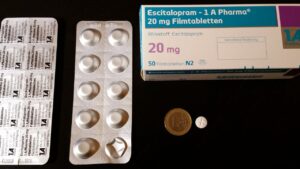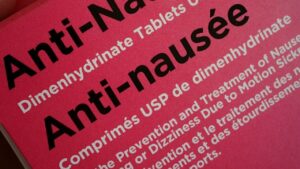Cocaine is a psychoactive stimulant that can result in serious health risks, including addiction and overdose. In addition to the risk of physical dependence, cocaine addiction can have significant impacts on a person’s mental well-being. In 2014, more than 1.5 million Americans reported current cocaine use. If you are concerned that someone you love is addicted to cocaine, treatment is available, but you need to recognize their problem first. Identifying cocaine isn’t always easy, especially if your loved one has it carefully stashed away. Instead, identifying the signs of cocaine use and use may be easier.
5 Signs Someone Is Addicted To Cocaine
When it comes to identifying a cocaine problem, there are certain signs and symptoms of cocaine use to be aware of. These signs of cocaine use may include:
1. Mood Swings And Change In Personal Habits
One common sign of cocaine addiction is dramatic changes in mood. They may appear excited and happy, then moody and withdrawn. Cocaine is a stimulant and may cause people to feel motivated, talkative, and satisfied. These mood swings can range from peppy and upbeat to anxious, nervous energy. Cocaine interacts with the brain’s limbic system, which is linked to the reward center. When people snort the drug, the entire dose hits the bloodstream quickly. This can result in a rush of energy and a sense of pleasure. However, cocaine also causes a comedown. Often called a “crash,” people who are coming down off cocaine may feel lethargic and fatigued. The muscles of the face and jaw may be sore, from tension or clenching. People coming down from a cocaine binge may have low energy levels and a depressed mood. Over time, these low moods can result in a complete disinterest in things they used to enjoy. [middle-callout]
2. Change In Physical Appearance
Other signs of cocaine use include noticeable changes in appearance. Repeated exposure to cocaine can take a toll on a person’s physical appearance. Lack of sleep and poor eating habits may result in a weak or pale appearance. Some people experience major weight fluctuations and may lose or gain weight in a short period of time. Cocaine is a stimulant and speeds up the whole body. People who are addicted to cocaine may talk fast and have dilated pupils. If a person snorts the drug regularly, they may suffer from a chronic runny nose. Being addicted to any type of drug can trigger a lack of personal hygiene. People who are focused on obtaining cocaine or finding the money for the drug may struggle with cleanliness and personal hygiene habits. They may wear unwashed clothes or appear ungroomed.
3. Strained Personal Relationships
One of the ways addiction unravels people’s lives is by straining their personal relationships. It’s very common for people who are struggling with an addiction to isolate from friends or family. One sign your loved one is addicted to cocaine may be that they shut themselves off from family and friends — especially if anyone has voiced concern about their drug use. Some people may begin spending large periods of time with a new group of acquaintances. Others may simply want to be alone. Sadly, these forms of social isolation can contribute to a person’s risk of dependence, addiction, and cocaine overdose.
4. Sudden Health Issues
Most drugs of use can lead to serious health concerns. With cocaine, the effects on a person’s health can be quite noticeable. People who smoke cocaine may have burn marks on the hands and lips. Regular insufflation of the drug can lead to chronic nosebleeds. However, cocaine can also lead to health issues that are much less obvious. The stimulating effects of the drug can put immense pressure on the systems of the body. Cocaine can cause permanent damage to a person’s heart, lungs, and breathing. This organ damage can result in seizures, convulsions, or stroke. Some of the most dangerous side effects of cocaine can happen suddenly, without any notice. Mental health can also be significantly altered by cocaine. Severe psychological damage can occur with regular use, especially when the drug is in a cooked form (crack cocaine). Cocaine use can lead to additional mental impacts that include:
- Anxiety
- Depression
- Psychotic episodes
- Memory issues
- Paranoia
- Hallucinations (feeling, hearing, or seeing things that are not there)
- Violent behavior
- Overdose
5. Drug Paraphernalia
People who are addicted to cocaine may carry supplies with them, or store it in their room. Cocaine paraphernalia includes spoons, small plastic bags, razor blades, and flat surfaces like mirrors. People who snort the drug may have straws, pen caps, or rolled up bills to use for insufflation. If a person smokes cocaine, they may use a glass pipe. When a person has these items in their possession, they may demand increased privacy. For some, this behavior may border on secrecy. If your loved one is struggling with cocaine addiction, they may fiercely guard their personal space and belongings. They may become angry or defensive if they believe their privacy is being threatened.
Cocaine Addiction, Withdrawal, And Detox
Anyone who uses cocaine has the potential to become addicted, as this drug causes a brief but intense high. Because this drug interacts with the brain’s reward center, people can become dependent on the substance very quickly. Research has found that cocaine dependence leads to intense physical and psychological cravings for the drug. When a person is dependent on cocaine, their brain and body require the drug in order to function normally. This can keep people locked in the cycle of cocaine addiction. People who suddenly stop using the drug may also experience acute withdrawal. Cocaine withdrawal symptoms include irritability, agitation, suspicion, and fatigue. Many people continue using the drug simply to avoid an uncomfortable withdrawal period. Fortunately, medical drug detox exists to help people through this difficult stage. In a medical detox program, patients are provided with medication-assisted treatment (MAT) to soothe any discomfort. Emotional support and supervision allow patients to detox in a controlled environment. This helps prevent relapse and is the first step toward a successful recovery.
Getting Help For Cocaine Addiction
For some people, cocaine addiction becomes a life or death situation. In 2017, nearly 14,000 people in the U.S. died from an overdose involving cocaine. Because this drug changes the chemical makeup of a person’s brain, it can be difficult to quit using without professional help. Fortunately, we provide cocaine addiction treatment in Massachusetts to help people struggling to stop on their own. Patients overcome active addiction by engaging in individual counseling, peer support groups, and mindfulness-based therapies. If you or someone you love is addicted to cocaine, recovery is possible.
For more information on cocaine addiction, or to learn about treatment options near you, reach out to us online or call 888.451.5895. At Swift River, formerly Swift River rehab, we want to help.











